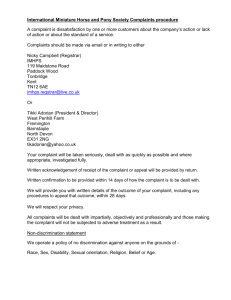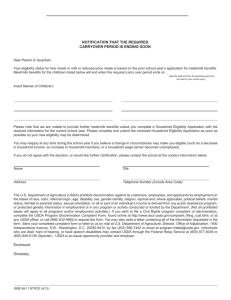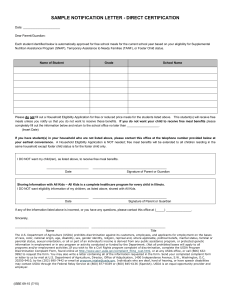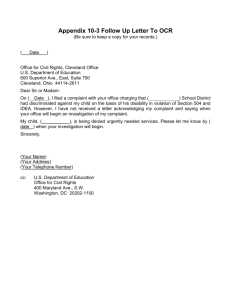Civil Rights Training
advertisement
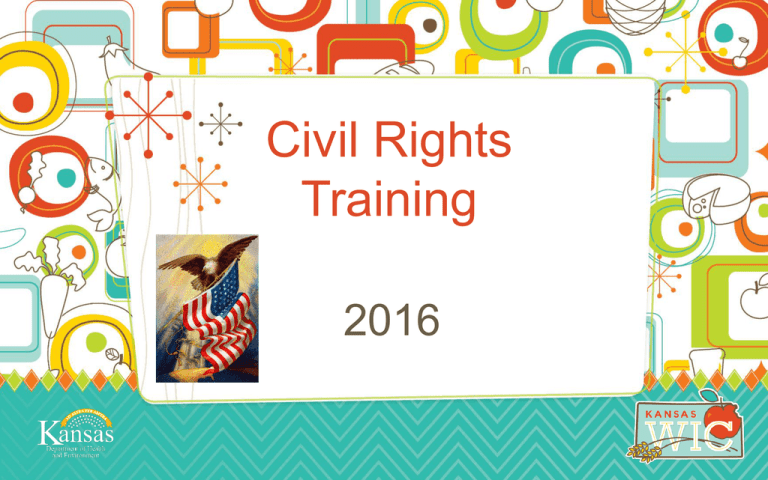
Civil Rights Training 2016 Objectives for this session • Upon completion of this activity, WIC Staff will be able to: • Understand the meaning of Civil Rights as it pertains to the various Civil Rights Laws. • Name the six protected classes identified in the Kansas WIC Program. • Understand the criteria used to collect racial/ethnic data. • Accurately inform clients/caregivers of their right to a fair hearing. Objectives, cont. • Appropriately record and submit civil rights complaints to the State Agency. • Establish what effective communication is and how it can be used to provide good customer service. • Identify resistant behaviors, which create communication barriers. • Learn strategies to resolve conflict and practice conflict resolution techniques Civil Rights Training • All new WIC staff must complete the “Civil Rights, Fair Hearings, and Civil Rights Complaints” training module within six months of the initial employment date. • All WIC staff will complete Civil Rights Training on an annual basis. • A record of LA Staff CR Trainings will be maintained in the LA Staff Training File Civil Rights Exist to ensure that all people have equal access to our program and are not treated differently than others. USDA prohibits discrimination on the basis of six classes. The Laws. . .Past and Present • Title VI of the Civil Rights Act of 1964 • Prohibits discrimination in programs and activities receiving Federal Financial assistance based on: • race, • color, and • national origin. The Laws. . .Past and Present • Title VII of the Civil Rights Act of 1964 • It is the policy of the U.S. Government to provide equal opportunity in employment for all persons. Equal opportunity must be an integral part of personnel policy and practice including employment selection, training, advancement and treatment. The Laws. . .Past and Present • Title IX of the Education Amendments of 1972 – Prohibits discrimination based on sex under any education program or activity receiving federal financial assistance. The Laws. . .Past and Present • Americans with Disabilities Act – Prohibits discrimination on the basis of disability in all services, programs, and activities provided to the public by State and Local governments. • Local Agency Responsibilities – Ensure that disabled applicants and clients are accorded the same benefits and access to facilities. – LA shall advise and provide applicants and clients with hearing, vision, speech or mental impairments communication systems and appropriate auxiliary aids that are as effective as communications with others at no cost to the participant. The Laws. . .Past and Present • Affirmative Action – The purpose is to overcome the effects of past societal discrimination by allocating jobs and resources to members of specific groups, such as minorities and women. Public Notification The public notification system must include the following basic elements: • Program Availability – Inform Applicants, clients, and potentially eligible persons of their oProgram Rights and Responsibilities oSteps necessary for participation Public Notification • Complaint Information ‾ Applicants and clients must be advised of their o Right to file a complaint o How to file a complaint o Complaint procedures • Local Agency Responsibilities ‾ Ensure that any applicant or client who seeks services provided by the Kansas WIC Program has the right to file a complaint of discrimination. Public Notification • Nondiscrimination Statement – Must be included on o All program materials and sources, including Web sites. – Must be read during o Radio and Television public service announcements. – Is not required on items such as o Cups, o Magnets, or o Pens. Non-Discrimination Statement • • • In accordance with Federal civil rights law and U.S. Department of Agriculture (USDA) civil rights regulations and policies, the USDA, its Agencies, offices, and employees, and institutions participating in or administering USDA programs are prohibited from discriminating based on race, color, national origin, sex, disability, age, or reprisal or retaliation for prior civil rights activity in any program or activity conducted or funded by USDA. Persons with disabilities who require alternative means of communication for program information (e.g. Braille, large print, audiotape, American Sign Language, etc.), should contact the Agency (State or local) where they applied for benefits. Individuals who are deaf, hard of hearing or have speech disabilities may contact USDA through the Federal Relay Service at (800)877-8339. Additionally, program information may be made available in languages other than English. To file a program complaint of discrimination, complete the USDA Program Discrimination Complaint Form, (AD-3027) found online at: http://www.ascr.usda.gov/complaint_filing_cust.html, and at any USDA office, or write a letter addressed to USDA and provide in the letter all of the information requested in the form. To request a copy of the complaint form, call (866)632-9992. Submit your completed form or letter to USDA by: Mail: U.S. Department of Agriculture, Office of the Assistant Secretary for Civil Rights, 1400 Independence Avenue, SW, Washington D.C. 20250-9410; or by fax: (202)690-7442; Email: program.intake@usda.gov. This institution is an equal opportunity provider. Non-Discrimination Statement • The full statement is found in – Policy PRI 01.01.00 o Civil Rights: Public Notification and Compliance • The short statement can be used when space is limited – This institution is an equal opportunity provider. Methods of Public Notification • Each State and Local Agency must inform the ‾ ‾ ‾ ‾ General public, Potentially eligible populations, Community leaders, Grassroots organizations, and referral sources about the WIC program and Civil Rights requirements. Public Notification • Posters – “And Justice For All,” and – “You Have a Right to a Fair Hearing,” • MUST be displayed in a prominent place in the lobby at all clinic sites. Fair Hearings • Procedure ‾ Outlined in Fair Hearings Request and Procedures Policy: PRI 03.01.00 o Availability of Hearings Any individual may appeal an adverse action. o Hearing System Hearings are held at the local level. Fair Hearings o Notification of Appeal Right a) At the time of suspension or participation denial, the individual must be informed in writing o Request for a Hearing a) Defined o Time Limit for Request o Continuation of Benefits Written Assurance • Is provided by: – The State Policy & Procedure Manual – Annual Contract signed and submitted by the Local Agency oIncludes non-discrimination compliance clauses Civil Rights File • Each Local Agency must maintain a file that contains: – Copies of discrimination complaints filed at the Local Agency – Correspondence from State Agency concerning complaints filed Data Collection and Reporting • Racial/Ethnic Data is collected by each Local Agency in the KWIC System. • Data is used to generate reports required by the Federal and State Governments. Identification o Self – Identification is the preferred means of obtaining information about an individual’s race and ethnicity. o Ethnicity refers to the identity with or membership in a particular racial, national, cultural group and observance of that group’s customs, beliefs and language. • Hispanic or Latino • Not Hispanic or Latino Identification • Race refers to a group of persons related by common descent or heredity. – – – – – Black or African-American White Asian American Indian or Alaskan Native Native Hawaiian or Pacific Islander Limited English Proficiency (LEP) • The LA shall provide interpretive services for all participants at no cost to the participant. • A participant, parent or guardian should NOT be required to use friends or relatives as interpreters. • How Local Agencies serve the LEP community. . . Records and CR Compliance • Records must be kept for the current year plus three. • Safeguards must be maintained that prevent the use of this information for discriminatory purposes. • Civil Rights compliance is evaluated at Local Agency Management Evaluations. Complaint Process • Civil Rights Discrimination Complaint – Record the Complaint on the CR Complaint Form located at http://www.ascr.usda.gov/complaint_filing_cust.html – A link to the USDA Program Discrimination Complaint form can also be found in the forms/administrative materials section under Local Agency Resources on the Kansas WIC website. o Place a copy of complaint in CR File. o Send complaint to the State Agency. o Maintain documentation of all correspondence in CR file. o Complaint is forwarded by the State Agency to the appropriate Regional or FNS OCR Director. o Record a note in KWIC indicating that a CR Complaint is on file Civil Rights Complaints • Any person or representative alleging discrimination based on a prohibited basis has the right to file a complaint within 180 days. • All complaints of discrimination, written or verbal, must be accepted. – Federal law prohibits retaliation for filing a complaint of discrimination • Use the WIC Civil Rights Discrimination Complaint Form located in the forms/administrative materials section under local agency resources on the website. Civil Rights Complaints o Refer to Policy PRI 01.02.00, Civil Rights Complaints o Verbal Complaints shall be written on the USDA Program Discrimination Complaint form by the person to whom the allegations are made. • Include detailed information on the complaint form Recording CR Complaints in KWIC Recording CR Complaints in KWIC Recording CR Complaints in KWIC Recording a Civil Rights Complaint on File in KWIC Participant Rights & Responsibilities • Participants shall be informed of their rights and responsibilities related to the WIC Program at certification. • Participants shall sign and date the R&R form at certification. • Signed R&R forms shall be retained in a file at the LA WIC Office. • The Rights and Responsibilities are listed on the client’s WIC Program Booklet • The booklet provides written notification to the client. Participant Rights & Responsibilities • Confidentiality – The LA shall keep all client/applicant information confidential. – Client information may NOT be released to a physician treating a client without that client’s consent. • Notification Letters – Provide assurance that all clients or applicants are aware of their right to appeal: o Denial of participation, o Suspension from the program, or o A claim for repayment of improperly issued benefits. Keys to Good Customer Service through Positive Communication What is Communication? Communication is: – To make known – To transmit – To exchange information or opinions Effective communication is a major key ingredient to creating good customer service. Nonverbal Communication • Can be one of the most difficult barriers to effective communication to overcome • What is nonverbal communication? – Environmental/Physical – Appearance-Participant and Staff member – Emotional Communication Barriers; Resistant Behavior Resistant Behavior Can Appear in Many Forms and from Either Party Involved • Agency Staff – Inattentive – Assumptive – Uncaring – Poor Eye Contact • Client – Hostile – Withdrawn – Negative Environmental/Physical • Examples of environmental or physical forms of non verbal communication (barriers) – Office environment – how is the organization of the office setting? – Noise level – Odors (pleasant or not) – Busy – how much traffic? Appearance/Dress • The appearance of the client can affect a staff member’s nonverbal communication • The appearance of a staff member can affect the nonverbal communication of the client • Does personal hygiene affect nonverbal communication? Nonverbal Communication Appearance Body Language Positive body language – – – – Smile Good eye contact Relaxed arms, open palms Nodding to show you understand Negative body language – – – – Frowning, rolling eyes Not focused on client Folded arms, tense Fidgeting Emotional • What is your stress level? • Are you tired and distracted? • Are you having a “bad” day? A Final Checklist On Nonverbal Communication • Be aware of how you use your voice – tone, volume, pace • Be aware of your position and posture • Be aware of your facial expressions • Consider your appearance Communication Exercise • Pick a partner • Half the room will turn their backs to one each other and the other half of the room will face each other. – – – – With a frown on your face introduce yourself to your partner ask them several questions and you respond back to them • With a smile on your face ask them the same thing. Keys to Unlocking the Doors of Resistance • • • • • • Use Reflective Listening Accept and Acknowledge Build Rapport Use Open-Ended Questions Avoid Being Judgmental Use “I” Statements Reflective Listening • Listen • Focus on what the person is saying to you • Don’t react to emotional words • Restate to the person what they have just told you • Focus on the problem not the person Accept and Acknowledge Create a caring and accepting environment • Communicate clearly and effectively – Smile • Listen to what your client has to say – Give your undivided attention • Show them that you care – Empathize with them Rapport Building Rapport is one of the most important features or characteristics of unconscious human interaction. It is commonality of perspective, being in "sync", being on the same "wavelength" as the person with whom you are talking. -Wikipedia Use Open-Ended Questions Open-Ended vs. Closed Questions Open-Ended: – – – – – – How are you doing . . To what extent . . . How often . . . Why . . . Tell me about . . . Help me understand. . . Closed: – – – – – Did you . . . Have you . . . Will you . . . Can you . . . When will you . . . “I” Statements Speaking for ourselves and not for others. “YOU” Statements • “You should breastfeed your infant; it is much healthier for him.” • “You should not give your child candy.” Create a Culture of Service for your Clients • • • • • Create a welcoming environment Use client names Discover their needs Show your appreciation for them Invite them back Conflict Resolution The Angry Client • When might a client become upset with WIC? – After becoming determined ineligible for WIC – After experiencing unsatisfactory customer service –? How can the situation be Defused? • • • • Listen to the client Open-ended questions Validate their concern Empower/Educate/Empathize Strategies for Moving out of a Crisis • Listen to the client. – Let them vent their frustration. – Be sincere and try to understand. – Receive the other’s comments without interruption. – Do not become defensive. Strategies for Moving out of a Crisis • Open ended questions should be asked tactfully. ‾ Identify the real issue. ‾ Avoid making excuses for anyone. ‾ Express your regret that the situation occurred. Strategies for Moving out of a Crisis • Validate the client’s concern. – Show a desire to help the participant work out the issue. – Most often, people in crisis are not capable of beginning with solutions. – The client needs to begin with emotional release in the first two steps. – Follow with a discussion of the problem. Strategies for Moving out of a Crisis • Empower the client by working together to find an answer. ‾ Empathize with the client and Respect their point of view. ‾ Educate by offering realistic solutions to the perceived problem. R-E-S-P-E-C-T • Above All Else, Show RESPECT! • Respect a person for their differences, that is what makes them unique! • Do not discriminate against anyone for their differences. References • Americans with Disabilities Act, http://www.usdoj.gov/crt/ada/adahom1.htm • Federal Interagency Working Group on Limited English Proficiency, www.lep.gov • Food and Nutrition Service Instruction 113-1 • U.S. Department of Agriculture Directives and Regulations, http://www.ascr.usda.gov/directives_regs.htm l • U.S. Department of Labor, http://www.dol.gov.esa.regs.statutes.ofccp.ada.htm • U.S. Equal Employment Opportunity Commission, http://www.eeoc.gov/ • U.S. Department of Agriculture Directives and Regulations, http://www.ascr.usda.gov/directives_regs.html Thank You Print this page to record Civil Rights Training Attendance AGENCY Name______________________________________________________________________ CR Topics Included in Training____________________________________________________ All current WIC staff must participate in Civil Rights Training at least once a year and document completion of that training. All new staff must participate in Civil Rights Training within six months of hire. Fill in the staff names and the date training was completed. Retain CR Training attendance in the Training folder. The SA will review this information during Management Evaluations. __________Staff Member______________________ Date_______ ________________________________________________________________________________________ ________________________________________________________________________________________ ________________________________________________________________________________________ ________________________________________________________________________________________ ________________________________________________________________________________________ ________________________________________________________________________________________ ________________________________________________________________________________________ ________________________________________________________________________________________ ________________________________________________________________________________________ ________________________________________________________________________________________ ________________________________________________________________________________________ ________________________________________________________________________________________ ________________________________________________________________________________________ ________________________________________________________________________________________ ________________________________________________________________________________________


